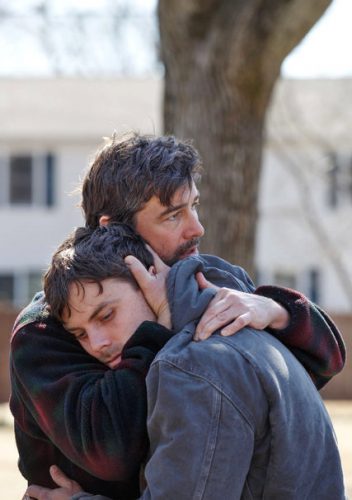
I’m pretty sure my wife and I would’ve gotten together without Kenneth Lonergan’s help, but you never know. It was the summer of 2002, and she was the first person I’d ever heard mention his film You Can Count On Me in casual conversation. A deceptively smart mixture of pathos and heart (and great acting), she counted it among her favorites as well. I’ve told the story elsewhere–let’s just say the episode doesn’t reflect particularly well on yours truly. But it should give you a sense of what the man’s work means to me.
When Lonergan’s long-delayed follow-up Margaret finally appeared on DVD in 2011, I immediately snatched it up. Pretty sure the director’s cut of that film remains the three most draining hours I’ve spent in front of a screen in a lifetime of watching movies, more than enough time for its brilliantly unlikable characters to burrow into your subconscious. It’s easy to understand why folks call it a masterpiece–but man, it’s a toughie.
https://www.youtube.com/watch?v=qtt0zwr3l_A
Manchester By the Sea essentially splits the difference between those two films. It recaptures the sweetness and (some of the) warmth of You Can Count On Me without flinching on the realism of Margaret. Lonergan’s eye for detail and ear for dialogue has only grown more refined, his structural decisions more daring. In fact, the overall confidence of the execution is remarkable when you consider how much resistance/trouble he encountered on Margaret. It is the single best film I’ve seen this year.
Lonergan is a master of synthesizing avalanches of emotion with the humdrum and often humorous realities of everyday existence in ways that enliven both. Grief coexists with carpool schedules, breakdowns with breakfast cereal. Wisecracks arrive at inopportune moments, just as they do in life. In his review for The AV Club, A.A. Dowd described the film as “almost operatic in the heartbreak it chronicles, that’s also attuned to everyday headaches, like forgetting where the car is parked and hitting your noggin on the freezer door.”
 While hardly what you would call plot-driven, a lot happens in Manchester by the Sea. Casey Affleck plays Lee Chandler, a hollowed-out handyman who’s summoned back to his titular North Shore hometown after his brother dies, in order to take care of his nephew (Lucas Hedges). From minute one, it’s clear that Lee is not just “Masshole” stoic but wounded beyond belief, a cloud hanging over his every breath. Writing for The New Yorker, Anthony Lane noted that there’s “a hint of savage penitence in his solitude”, and he’s 100% right. This is a man serving time, buried but not yet dead. It is to Casey Affleck’s enormous credit that he’s able to make the numbness so compelling.
While hardly what you would call plot-driven, a lot happens in Manchester by the Sea. Casey Affleck plays Lee Chandler, a hollowed-out handyman who’s summoned back to his titular North Shore hometown after his brother dies, in order to take care of his nephew (Lucas Hedges). From minute one, it’s clear that Lee is not just “Masshole” stoic but wounded beyond belief, a cloud hanging over his every breath. Writing for The New Yorker, Anthony Lane noted that there’s “a hint of savage penitence in his solitude”, and he’s 100% right. This is a man serving time, buried but not yet dead. It is to Casey Affleck’s enormous credit that he’s able to make the numbness so compelling.
Over the course of the film, through the expert interspersal of flashbacks, we learn about Lee’s past, what made him the way he is. I won’t spoil it for you except to say that, from where I’m sitting, “worst nightmare” would be an understatement. This time it is to Lonergan’s enormous credit that the proceedings do not once collapse into melodrama.
In a fantastic New Yorker profile a couple weeks ago, Rebecca Mead got Lonergan to speak about his vision for the character:
In his depiction of Chandler, Lonergan challenges a bromide that is often invoked in the face of depression or sorrow: that personal growth can be wrested from even the most terrible suffering. “I have seen a lot of movies—and they are really great movies—about people who come back from bad things and are redeemed,” Lonergan told me this summer. “[But] some people don’t come back,” he continued. “I don’t see how you come back from some things. I don’t see how people get through what they get through.” Describing Chandler, he said, “The character doesn’t learn to live with and move on from what happened. It’s part of him for the rest of his life.”
 So if the film is “about” anything, it is grief with a capital G (“Men” is probably the secondary theme). Sounds super bleak, I know, but you’d be surprised. Manchester by the Sea is not ultimately a downer. There may not be redemption, per se, but that doesn’t mean some rays of light don’t peak through before the credits roll.
So if the film is “about” anything, it is grief with a capital G (“Men” is probably the secondary theme). Sounds super bleak, I know, but you’d be surprised. Manchester by the Sea is not ultimately a downer. There may not be redemption, per se, but that doesn’t mean some rays of light don’t peak through before the credits roll.
The film is also really funny, full of affectionate jabs at adolescent cluelessness, my personal favorite being Stentorian and their hapless drummer, Otto. Turns out teenagers don’t stop being teenagers when they’re grieving. Oh and Catholics are Christians too, you know.
Of course, all this has been mentioned elsewhere. What inspired me to write about the film was the tidbit that Vanity Fair gleaned a few weeks ago from Lucas Hedges. The key to his performance came when the young actor began to read the script as a “narrative of grace”.
How might we understand Manchester by the Sea in those terms? A few thoughts:
Lonergan does indeed resist instrumentalizing suffering, thank God. Lee’s heart has been pulverized, and it will never work right again. There is no beating what’s happened to him, no moving on. To the extent that help arrives, it breaks in from the outside in the form of his nephew Patrick, a gift Lee didn’t ask for, doesn’t ‘deserve’, and can’t really accept. But he doesn’t not accept it either.
The gift works on him, subtly yet coercively, one tiny step forward, two long strides backward, the same way grace often operates in actual life. Lonergan refuses to give us anything as tidy as catharsis, but he wouldn’t be true to his characters and their predicament without dropping a few signs of hope–such is the cruciform nature of reality.

For instance, Lee mentions in a flashback how much he loves the sea. It represents everything good, everything that’s been lost. Thus, as part of his self-imposed prison sentence, he has retreated to the shore, stranded for all intents and purposes. Only after his initial breakthrough comes–the impromptu selling of the rifles (instruments of death) to fulfill the boy’s irresponsible wish (an act of grace in itself)–does he venture back onto a boat and move into his brother’s more comfortable bedroom. These two small comforts he allows himself aren’t small at all. They signal a loosening of the punitive stranglehold, possibly the advent of healing, such as it may be.
The motor they buy with the money is second-hand, i.e. beat-up, but it’ll do. I took the purchase as an indication that some minuscule crevice of Lee’s heart had begun beating again, at least enough for him to direct his anger at its true target, the sea/horizon/God. Which he does, much to his window’s detriment.
 The blows keep coming of course–life doesn’t stop. The scene with Michelle Williams in the street is so true it hurts. But Lee’s route back to something resembling a life couldn’t occur without a run-in with his ex-wife–and the forgiveness he can’t consciously accept (but can’t completely deter either). Their encounter is bookended by interactions at his brother’s funeral and then his burial. The occasions are separated by a few months–the latter cannot happen until the weather gets warmer–but both are presided over by a priest, with Handel’s Messiah taking the place of any spoken dialogue.
The blows keep coming of course–life doesn’t stop. The scene with Michelle Williams in the street is so true it hurts. But Lee’s route back to something resembling a life couldn’t occur without a run-in with his ex-wife–and the forgiveness he can’t consciously accept (but can’t completely deter either). Their encounter is bookended by interactions at his brother’s funeral and then his burial. The occasions are separated by a few months–the latter cannot happen until the weather gets warmer–but both are presided over by a priest, with Handel’s Messiah taking the place of any spoken dialogue.
At the burial, one presumes that the ground isn’t the only thing that’s softened (ever so slightly). Afterward we watch as Lee and Patrick walk back to the house together. For the first time Lee has one hand out of his pockets, bouncing a stray ball (a quintessentially ‘carefree’ activity). Somber and broken as he’ll no doubt remain, Lee is no longer alone. He can’t stay in Manchester–there’s no coming back from what happened. But maybe there doesn’t have to be. Because sometimes grace looks less like a mansion on a hill and more like a one-bedroom apartment in Boston. Or, you might say, less like sailing a yacht on a sunny morning and more like fishing off the back of a makeshift trawler on an overcast afternoon.

COMMENTS
14 responses to “Manchester By the Sea: Notes on the Best Film of the Year”
Leave a Reply













Only tiny gripe with the entire film is the soft-focus Jesus portrait on Gretchen Mol and Matthew Broderick’s wall. The characterization there is spot-on, as are the LifeWay knick-knacks, but that detail was off, not to mention far too on-the-nose, senisibility-wise.
Also, if they keep this up, someone’ll have to do “You Know You’re a Matthew Broderick Character in a Kenneth Lonergan Film When…” list.
Wow – great review! and agreed, best film of the year, easy.
Especially love your insights in the graph on punching the window, what a scene.Totally captured how much of a character the sea was throughout.
And then on bouncing the ball… That was the first time he walked with a hand out of his pockets?? There really was such freedom in that post-burial saunter.
Also, it’s been mentioned in some reviews, but that detail with the bodies being raised into the ambulance and getting stuck, excruciating, like patrick banging his head on the freezer.
Thank you, Dave. This film was magnificent. I knew from the opening scene that Chandler was in some sort of emotional prison. You explained it perfectly. I knew that I would find out what put him there eventually and when I did it was akin to being stabbed in the gut. I didn’t see it coming and I couldn’t look away and oh the tears flowed.
I was a blubbering blob. The simpleness (I’m no genius movie analyst though I long to be and act as though I am) of going back and forth in the timeline to just see the utter contrast in Lee’s demeanor before and after the defining moment in his life. Sure it’s the obvious thing to point out. But it’s powerful. Lonergan doesn’t do it all at once. He keeps reminding you that Lee was “normal” or typical. He lets you live in the life before the death. And the he brings you back to the crushed life. And the general uneasiness of George (CJ Wilson), who was close to the brother as well, around a man he hasn’t seen much of in years, who has just had another loss added to his already devastating life. The audience’s surrogate, or at least the closest we get to one in this film. Casey Affleck deserves every accolade he receives. As does Lucas Hedges. And certainly Lonergan. So glad this movie award season is here.
DZ, great review. It was a powerful film, and it needed someone like yourself to write a reflection such as this.
Finally saw this last night and “haunting” is definitely the best description I can think of as I’m still thinking about it.
One thought in particular made it even more so for me — I don’t think there was anything more than alcohol involved at that party. That entire confession scene bothered me, as Casey Affleck seemed to be mostly with it that night. He didn’t drive… He even remembered to pick up diapers.
His shock at not being arrested combined with his actions immediately thereafter seems much more in line with someone trying to punish himself.
Thoughts?